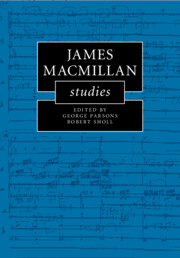Book contents
- James MacMillan Studies
- James MacMillan Studies
- Copyright page
- Contents
- Music Examples
- Tables
- Contributors
- Foreword
- Acknowledgements
- Introduction
- 1 The Struggle with Conviction: A Trio of String Quartets
- 2 Conflicting Modernities and a Modernity of Conflict in James MacMillan’s The World’s Ransoming
- 3 In Memoriam: James MacMillan’s Violin Concerto as Modernist Lament
- 4 Reincarnating The Tryst: The Endurance of a Simple Love Song
- 5 Exquisite Violence: Imagery, Embodiment and Transformation in MacMillan
- 6 Making the Familiar Unfamiliar: MacMillan’s St Luke Passion
- 7 MacMillan’s ‘Mission’ and the Passion Settings
- 8 A Cluster of Gathering Shadows: Exposition and Exegesis in Seven Last Words from the Cross
- 9 James MacMillan’s The Sun Danced: Mary, Miracle and Mysticism
- 10 ‘Shrouded in Doubts and Fears’: The Liturgical Music of James MacMillan
- 11 Containing Chaos? Aspects of Medieval Liturgy in James MacMillan’s Visitatio Sepulchri
- Bibliography
- Index
3 - In Memoriam: James MacMillan’s Violin Concerto as Modernist Lament
Published online by Cambridge University Press: 20 August 2020
- James MacMillan Studies
- James MacMillan Studies
- Copyright page
- Contents
- Music Examples
- Tables
- Contributors
- Foreword
- Acknowledgements
- Introduction
- 1 The Struggle with Conviction: A Trio of String Quartets
- 2 Conflicting Modernities and a Modernity of Conflict in James MacMillan’s The World’s Ransoming
- 3 In Memoriam: James MacMillan’s Violin Concerto as Modernist Lament
- 4 Reincarnating The Tryst: The Endurance of a Simple Love Song
- 5 Exquisite Violence: Imagery, Embodiment and Transformation in MacMillan
- 6 Making the Familiar Unfamiliar: MacMillan’s St Luke Passion
- 7 MacMillan’s ‘Mission’ and the Passion Settings
- 8 A Cluster of Gathering Shadows: Exposition and Exegesis in Seven Last Words from the Cross
- 9 James MacMillan’s The Sun Danced: Mary, Miracle and Mysticism
- 10 ‘Shrouded in Doubts and Fears’: The Liturgical Music of James MacMillan
- 11 Containing Chaos? Aspects of Medieval Liturgy in James MacMillan’s Visitatio Sepulchri
- Bibliography
- Index
Summary
James MacMillan contends music should awaken the senses to the possibility of beauty. To do this, he crafted his own form of ‘modernist lament’ (David Metzer), thus creating a form of beauty capable of embracing the dark elements of human experience without descending into nihilistic despair. MacMillan’s lament compositions fit into three themes: (1) the death of Jesus, (2) the life and death of particular historical persons, and (3) memorial works that either lament particular persons or commemorate communal tragedy. This chapter will focuses on the third classification through MacMillan’s Violin Concerto (2009), written in memoriam of his mother, Ellen MacMillan. The first section will adumbrates the category of late modernist lament. The next section will examines a number of themes from MacMillan’s memorial works, which often pull from the traditions of Gaelic keening and heterophonic psalm singing. The final section will applies these ideas to the Violin Concerto. The concerto does not prioritize grief but, instead, moves between mourning and celebration. The dance between the violin’s virtuosity and the orchestra’s vibrant tapestry of color takes the listener on a journey through a whirl of emotions: the sweet, the nostalgic, the festive, and the anguish of memory and loss.
- Type
- Chapter
- Information
- James MacMillan Studies , pp. 48 - 66Publisher: Cambridge University PressPrint publication year: 2020

